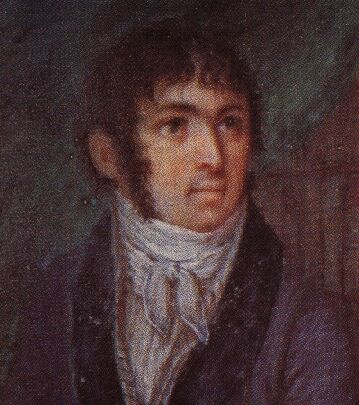Antoine Fabre d'Olivet
 '''Antoine Fabre d'Olivet''' (8 December 1767, Ganges, Hérault – 25 March 1825, Paris) was a French author, poet and composer whose Biblical and philosophical hermeneutics influenced many occultists, such as Eliphas Lévi, Gérard Encausse ("Papus") and Édouard Schuré.
'''Antoine Fabre d'Olivet''' (8 December 1767, Ganges, Hérault – 25 March 1825, Paris) was a French author, poet and composer whose Biblical and philosophical hermeneutics influenced many occultists, such as Eliphas Lévi, Gérard Encausse ("Papus") and Édouard Schuré.His best known works are on the research of the Hebrew language and the history of the human race entitled (1) ''The Hebraic Tongue Restored: And the True Meaning of the Hebrew Words Re-Established and Proved by their Radical Analysis'', and (2) ''Hermeneutic Interpretation of the Origin of the Social State of Man and of the Destiny of the Adamic Race''. Other works of renown are on the sacred art of music entitled ''Music Explained as Science and as Art and Considered in its Analog Relationship with Religious Mysteries, Ancient Mythology and the History of the Earth'', and a translation and commentary of Pythagoras's thirty-six Golden Verses.
His interest in Pythagoras and the resulting works started a revival of Neo-Pythagoreanism that would later influence many occultists and new age spiritualists. He attempted an alternative interpretation of Genesis, based on what he considered to be connections between the Hebrew alphabet and hieroglyphs. The discovery of the Rosetta Stone and the subsequent decipherment of Egyptian hieroglyphs that followed would prove much of this particular work technically mistaken. He was declared a non-person by Napoleon I.
An interesting story involves his supposed healing of a deaf boy, Rodolphe Grivel, of his hearing impairment, and then having Napoleon officially declare that he is never again to heal another person of deafness. He indicates that he kept the letter of notice out of amusement. Outside of esotericism, he also invented the poetic measure of ''eumolpique''. He had a discussion with Lord Byron over the British poet's publishing of a play, ''Cain'', in which he said that since both of them were raised as reformed Protestants, he wrote: "We can understand one another perfectly; and if I didn't have anything to reprove you as a heretic, you would not have to fear my orthodoxy". D'Olivet thought that because Lord Byron did not use the original Hebraic version of the text of Sacred Scripture, but instead a misleading English translation in the play, is therefore leading others towards falsity and away from truth. Provided by Wikipedia
1
2
3
4
5
6
7
8
9
10
11
12
13
14
15
16
